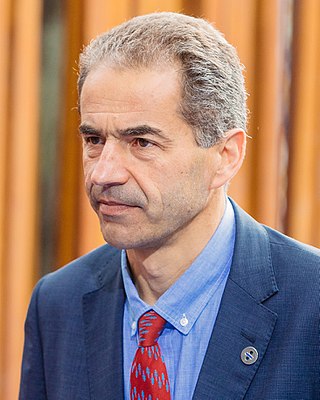Top Qs
Timeline
Chat
Perspective
Manuel Heitor
Portuguese politician From Wikipedia, the free encyclopedia
Remove ads
Manuel Frederico Tojal de Valsassina Heitor (born 1958) is a Portuguese politician who served as Minister of Science, Technology and Higher Education in the government of Prime Minister António Costa since 26 November 2015[update] until 30 March 2022 when he was succeeded by Elvira Fortunato.[2][3]
You can help expand this article with text translated from the corresponding article in Portuguese. (September 2018) Click [show] for important translation instructions.
|
Remove ads
Early life and education
Heitor graduated with a PhD in mechanical engineering from Imperial College London, and did a post-doctoral at the University of California, San Diego.
Career
Summarize
Perspective
Political career
From March 2005 to June 2011, Heitor served as the secretary of state for science, technology and higher education under minister Mariano Gago in the government of Prime Minister José Sócrates.[2]
During his time as minister, Heitor notably announced plans in 2018 to build an international launch pad for small satellites on Santa Maria Island and agreed with China to set up a joint research centre to make satellites on the mainland.[4] When Portugal held the rotating presidency of the Council of the European Union in the first half of 2021, he chaired the meetings of the EU research ministers.
Return to academia
Since leaving government, Heitor has been a visiting research professor at New York University's Center for Urban Science and Progress (CUSP), and at the NYU Marron Institute. He is also a visiting scholar at Harvard Graduate School of Design.[5]
In 2023, the Conference of European Schools for Advanced Engineering Education and Research (CESAER) appointed Heitor as its Envoy on Research Careers.[6]
Also since 2023, Heitor has been chairing an expert group entrusted to support the interim evaluation of the European Union's Horizon Europe programme.[7] Their report "Align, Act, Accelerate: Research, Technology and Innovation to boost European competitiveness" was published in late 2024.[8]
Remove ads
References
Wikiwand - on
Seamless Wikipedia browsing. On steroids.
Remove ads

